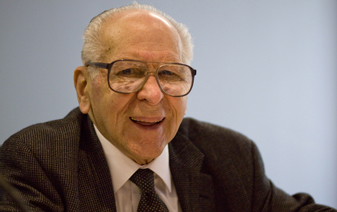Thomas Szasz citáty a výroky
Thomas Szasz: Citáty v angličtine
"Personal Conduct" http://books.google.com/books?id=IYOcAQAAQBAJ&q=%22The+stupid+neither+forgive+nor+forget+the+na%C3%AFve+forgive+and+forget+the+wise+forgive+but+do+not+forget%22&pg=PA177#v=onepage, p. 51. http://openlibrary.org/works/OL15151528W/The_Second_Sin
The Second Sin (1973)
“Boredom is the feeling that everything is a waste of time; serenity, that nothing is.”
"Emotions", p. 36.
The Second Sin (1973)
“In the animal kingdom, the rule is, eat or be eaten; in the human kingdom, define or be defined.”
Zdroj: The Second Sin (1973), p. 20.
"Science and Scientism", p. 115.
The Second Sin (1973)
Zdroj: The Myth of Mental Illness: Foundations of a Theory of Personal Conduct
The Untamed Tongue: A Dissenting Dictionary (1990)
Zdroj: The Manufacture of Madness: A Comparative Study of the Inquisition and the Mental Health Movement (1997), p. 162.
Zdroj: The Manufacture of Madness: A Comparative Study of the Inquisition and the Mental Health Movement (1997), p. 164.
Schizophrenia: The Sacred Symbol of Psychiatry (1979)
Zdroj: The Manufacture of Madness: A Comparative Study of the Inquisition and the Mental Health Movement (1997), p. 160.
Zdroj: The Manufacture of Madness: A Comparative Study of the Inquisition and the Mental Health Movement (1997), p. 161.
"The Protocols of the Learned Experts on Heroin" http://www.scribd.com/doc/120817550/The-Protocols-Of-The-Learned-Experts-On-Heroin-by-Thomas-Szasz in The Libertarian Review, July 1981, p. 14.
“In the past, men created witches: now they create mental patients.”
The Manufacture of Madness (1970) http://books.google.com/books?id=hpOcRRum3XEC&pg=PR24&q="In+the+past+men+created+witches+now+they+create+mental+patients".
Zdroj: The Manufacture of Madness: A Comparative Study of the Inquisition and the Mental Health Movement (1997), p. xi.
"The Sane Slave: Social Control and Legal Psychiatry," American Criminal Law Review, vol. 10 (1971), p. 346.
Zdroj: Anti-Freud (1990), p. 55.
Preface to the Second Edition.
The Myth of Mental Illness: Foundations of a Theory of Personal Conduct (1961)
